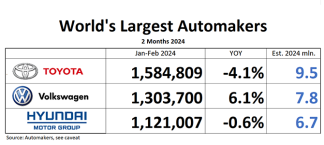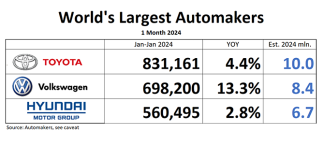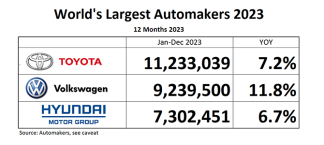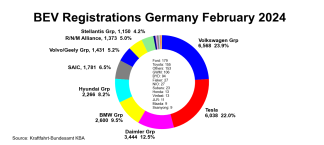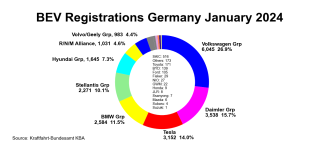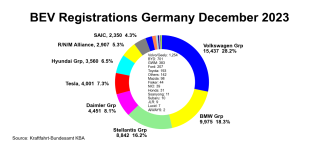As predicted by the DailyKanban for about six months, Toyota remains World’s Largest Automaker. Also as predicted, new numbers suggest that Toyota might lose its crown by the end of 2015. That was the unsurprising part of the news. The surprising part is that the world’s largest automaker thinks that the global auto market is peaking. Toyota budgets for a slight downturn, which is expected to decrease global sales and production of the world’s largest automaker by 1 percent in 2015.
| World’s Largest Automakers | |||
| 12 Month 2014 (preliminary) | |||
| Jan-Dec 2014 | Jan-Dec 2013 | YoY | |
| Toyota | 10,313,000 | 10,117,274 | 1.9% |
| Volkswagen | 10,140,000 | 9,730,000 | 4.2% |
| GM | 9,924,880 | 9,714,652 | 2.2% |
| Source: Company data. GM, VW: Deliveries. Toyota: Production. Blue: Preliminary, see text |
|||
On a group level, including Daihatsu and Hino, Toyota sold 10,231,000 units globally in 2014, the company said in a statement today. Caveat for car counters: While its peers announce “deliveries” to wholesale, Toyota’s “sales” number attempts to come as close as possible to actual sales to end users, which can be quite a challenging exercise. For more on the thorny subject, see our standard footnote. For a final comparison with the “deliveries” of Toyota’s peers, we need Toyota’s production number. That number, however, will be announced later in the month.
What has been announced today is that Toyota expects for 2015 that its worldwide production will sink, compared to the unannounced 2014 production number, by 1 percent to 10.21 million, and that its worldwide “sales” will likewise sink by 1 percent to 10.15 million. What is the unannounced 2014 production number? Using the minus one percent in reverse puts Toyota’s 2014 production number at 10.31 million.
That’s within a hair to the 10.33 million the DailyKanban expected in December, and very close to the 10.35 million we expected half a year ago. Warning: Due to the fallacies of the rounding error, the actual production number, to be published next week, can be 50,000 more, or less.
Asked why Toyota sees darker clouds on the horizon, Toyota’s Tokyo spokesman Nicholas Maxfield explained that, from a Toyota perspective, this is largely driven by a negative outlook for the Japanese market:
“We expect Toyota and Lexus brand global production of 9.01 million units in 2015, which would actually be actually a 0.1% year-on-year increase. Of that, Japanese production is expected to be 3.13 million units, down 4% year-on-year. Production outside Japan is expected to be 5.88 million units, up 3% year-on-year.”
With 75 percent of its sales in Japan, mini vehicle maker Daihatsu is most exposed to the budgeted downturn of the Japanese market. Toyota budgets for a 15 percent decrease of Daihatsu’s sales in Japan, along with a 9 percent decrease of Daihatsu’s global 2015 production. Daihatsu commands a 31 percent share of the booming Japanese mini vehicle market. It would be interesting to find out what prompted the pessimism. When I tried, the Toyota spokesman said that “Toyota Group members make their own decisions based on carefully examining and understanding a wide variety of factors, and we’d like to refrain from commenting.”
Bottom line: Toyota does not share the sometimes exuberant outlook of its peers. Excluding Japan, Toyota expects the market to be flat, including Japan, the market is seen trending back to earth, ever so slowly. Echoing a cautionary stance that has guided Toyota for more than a year, Maxfield said that Toyota believes:
“Growth in volume is not the same as sustainable growth. Going forward, we aim to continue to concentrate on making one car at a time, and to promote car-making that will result in people continuing to choose us.”
Toyota will retain the title of World’s Largest Automaker through 2015. The way things look, World’s Largest Automaker 2015 should be Germany’s Volkswagen – if its bet on unbridled expansion of auto sales pans out, that is. A problem in China, for instance, could derail all plans. With more than a third of their volume in China, both GM and Volkswagen are very dependent on the Middle Kingdom’s stability. Toyota, not so much.
Standard car counting disclaimer: The world automaker umbrella organization OICA ranks automakers according to overall production, including heavy trucks and buses. So do we. Toyota reports both sales and production, we take production. Volkswagen and GM report “deliveries” to wholesale – which is, at least for this exercise, close enough to production. For crowning purposes, OICA and the DailyKanban do not track “sales” due to methodical differences around the world. For more on the dangers of car counting, see here.

